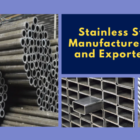Top Tube Fittings You Need to Know for Efficient Piping Systems
Instrumentation Tube Fittings Manufacturers Suppliers Exporters in India
Building an efficient and reliable piping system requires the right components, and tube fittings are among the most crucial. These versatile connectors ensure leak-free, secure connections and enhance the performance and longevity of pipelines in various industries. Whether for industrial, residential, or commercial applications, understanding the types and uses of tube fittings is essential for optimal system performance. In this blog, we’ll explore the top tube fittings, their characteristics, materials, applications, and the key factors to consider when selecting them.
Mcneil Instruments, a leading manufacturer, supplier and exporter of Instrumentation Tube Fittings, provides top solutions across various industries. Mcneil Instruments brings to you the best range of tube fittings that are used for connecting runs of in-line, multi-port, and in-line configurations. There are many uses for these tube fittings in vital parts of systems. Hence it is important to use only the best tube fitting made only by the Best Tube Fittings Manufacturers across India.
Introduction to Tube Fittings
Tube fittings are connectors used to join two or more pipes or tubes within a piping system. They ensure smooth flow and prevent leaks, making them indispensable in industries like instrumentation, oil and gas, plumbing, and chemical processing. Designed to meet specific application needs, tube fittings are available in a wide range of shapes, sizes, and materials.
Whether you’re assembling a high-pressure pipeline or a low-pressure residential system, selecting the correct tube fitting is critical to achieving a reliable and efficient connection. This blog will serve as your comprehensive guide to tube fittings, providing insights into their types, features, and uses.
What Are Tube Fittings?
Tube fittings are essential components that provide a secure and reliable connection in piping systems. They are designed to:
- Prevent fluid or gas leaks by creating tight seals.
- Facilitate connections in straight, angled, or multi-directional pathways.
- Withstanding high-pressure and high-temperature environments, ensuring durability and performance.
Manufactured from materials like stainless steel, brass, and specialized alloys, tube fittings are built for strength, corrosion resistance, and long-lasting functionality. Their applications range from industrial instrumentation systems to household plumbing, making them versatile tools for engineers and contractors.
Types of Tube Fittings
Understanding the different types of tube fittings is vital for selecting the right one for your system. Here are the top tube fittings you should know:
| Tube Fitting Type | Description |
| Straight Union | Connects two pipes in a straight line, ensuring precision and reliability in alignment. |
| Union Elbow | Joins pipes at a 90-degree angle, ideal for tight spaces or where direction changes are needed. |
| Union Cross | Links four pipes in a cross configuration, perfect for creating complex fluid pathways. |
| Union Tee | Connects three pipes in a T-shape, allowing for multiple flow directions. |
| Reducing Union | Connects pipes of different diameters, facilitating smooth transitions without pressure loss. |
| Reducing Tee | A T-shaped fitting that accommodates pipes of varying sizes, ensuring versatility in connections. |
| Bulkhead Union | Provides a sealed connection through walls or panels for secure installations in structural setups. |
| Bulkhead Union Elbow | Combines bulkhead functionality with a 90-degree angle, ideal for angled connections through panels. |
| Connector NPT | Ensures a secure and tight connection with National Pipe Threads (NPT), commonly used in industries. |
| Male Run Tee | A T-shaped fitting with a male-threaded connection, perfect for distributing flow efficiently. |
Each fitting serves a unique purpose, making it essential to choose the right type based on your application requirements.
Materials Used in Tube Fittings
The choice of material impacts the performance and durability of tube fittings. Mcneil Instruments manufactures fittings using:
- Stainless Steel: Known for its corrosion resistance, this material is ideal for high-pressure and high-temperature applications. It is commonly used in industries like petrochemical, marine, and instrumentation.
- Brass: Brass fittings are highly durable and resistant to wear and tear, making them suitable for low-pressure plumbing and water systems.
- Alloys: Alloy-based fittings provide strength and stability in extreme environments. They are often used in aerospace and chemical processing industries.
These materials ensure that Mcneil Instruments’ fittings meet international standards for durability and reliability.
Specifications, Characteristics and Key Features of Tube Fittings:
| Tube Fitting Type | Material | Pressure Rating | Temperature Range | Key Characteristics |
| Straight Union | Stainless Steel, Brass, Alloys | High-pressure up to 6000 PSI | -100°C to 400°C | Ensures precise alignment and reliable straight connections between two pipes. |
| Union Elbow | Stainless Steel, Brass, Alloys | Moderate to High Pressure | -100°C to 350°C | Provides a secure 90-degree connection, ideal for tight spaces or directional changes. |
| Union Cross | Stainless Steel, Brass, Alloys | High-pressure systems | -100°C to 400°C | Links four pipes securely, enabling complex and multidirectional flow pathways. |
| Union Tee | Stainless Steel, Brass, Alloys | Moderate to High Pressure | -100°C to 350°C | Facilitates T-shaped connections, allowing branching flow directions. |
| Reducing Union | Stainless Steel, Brass, Alloys | High-pressure systems | -100°C to 400°C | Seamlessly connects pipes of varying diameters for smooth transitions. |
| Reducing Tee | Stainless Steel, Brass, Alloys | Moderate to High Pressure | -100°C to 350°C | Accommodates connections of different pipe sizes in T-shaped configurations. |
| Bulkhead Union | Stainless Steel, Brass, Alloys | High-pressure systems | -100°C to 400°C | Provides a leak-proof connection through walls or panels, ensuring durability. |
| Bulkhead Union Elbow | Stainless Steel, Brass, Alloys | Moderate to High Pressure | -100°C to 350°C | Combines bulkhead functionality with a 90-degree angle for angled connections. |
| Connector NPT | Stainless Steel, Brass, Alloys | High-pressure systems | -100°C to 400°C | Offers secure, threaded connections using National Pipe Thread (NPT) standards. |
| Male Run Tee | Stainless Steel, Brass, Alloys | High-pressure systems | -100°C to 400°C | Ensures efficient distribution of flow with male-threaded T-shaped connections. |
Key Features:
- Material Options: Stainless steel for corrosion resistance, brass for durability in low-pressure systems, and alloys for extreme conditions.
- Pressure Handling: Suitable for applications ranging from moderate to high pressures.
- Temperature Tolerance: Designed to perform under varying temperature conditions without compromising integrity.
- ISO Certified: Adherence to international quality standards, ensuring reliability and safety.
Tube Fitting Sizes and Threads
Tube fittings come in various sizes to accommodate diverse piping requirements. Common sizes include small diameters for instrumentation systems and larger sizes for industrial pipelines.
| Tube Fitting Type | Available Sizes (OD) | Thread Type | Thread Sizes | Key Applications |
| Straight Union | 1/8” to 2” | NPT, BSP, UNF | 1/8” to 2” | Connects pipes of the same size in a straight line for uninterrupted flow. |
| Union Elbow | 1/4” to 1-1/2” | NPT, BSPT | 1/8” to 1-1/2” | Provides 90-degree directional changes, suitable for compact piping systems. |
| Union Cross | 1/8” to 1” | NPT, BSP | 1/8” to 1” | Multi-directional flow management in complex piping systems. |
| Union Tee | 1/4” to 2” | NPT, BSP | 1/8” to 2” | Diverts flow into T-shaped configurations for branching pipelines. |
| Reducing Union | 1/8” to 1” (Reducer Ends) | NPT, BSP | 1/8” to 1” | Connects pipes with varying diameters for efficient transitions. |
| Reducing Tee | 1/4” to 1” (Reducer Ends) | NPT, BSP | 1/4” to 1” | Joins pipes of different sizes in T-shaped configurations for diverse flow paths. |
| Bulkhead Union | 1/8” to 1-1/2” | NPT, BSP | 1/8” to 1-1/2” | Passes securely through walls or panels, maintaining flow integrity. |
| Bulkhead Union Elbow | 1/4” to 1” | NPT, BSPT | 1/8” to 1” | Combines wall-mount capability with angled connections for space-efficient piping. |
| Connector NPT | 1/8” to 2” | NPT | 1/8” to 2” | Provides reliable threaded connections adhering to NPT standards. |
| Male Run Tee | 1/4” to 1-1/2” | NPT, BSP | 1/8” to 1-1/2” | Male-threaded T-shaped connections for distributing flow in high-pressure systems. |
Key Features of Tube Fitting Sizes and Threads:
- Size Variability: Accommodates a wide range of outer diameters (OD) for diverse piping needs.
- Thread Compatibility: Includes NPT (National Pipe Thread), BSP (British Standard Pipe), and BSPT (British Standard Pipe Tapered) standards.
- Custom Solutions: Available in reducing and standard configurations to meet specific project requirements.
- Leak-Proof Connections: Threads are designed for secure and reliable performance under pressure.
Shapes and Configurations
The shapes and configurations of tube fittings cater to specific design needs:
- Straight Fittings: Used for direct connections between two pipes.
- Angled Fittings (90° or 45°): Perfect for changing pipe directions in constrained spaces.
- T-Shaped and Cross-Shaped Fittings: Enable multiple flow pathways, enhancing system functionality.
Choosing the Right Tube Fitting
When selecting the right tube fitting, consider the following:
- Material Compatibility: Match the fitting material to the fluid or gas being transported.
- Connection Type: Choose from threaded, welded, or compression connections based on your system’s needs.
- Pressure and Temperature Ratings: Ensure the fitting can withstand the operating conditions of your system.
Applications of Tube Fittings
Tube fittings have a broad range of applications, including:
- Industrial Systems: High-pressure pipelines in industries like oil and gas, chemical processing, and power plants.
- Residential Plumbing: Secure connections for water and gas supply lines in homes.
- Aerospace and Automotive: Precision-engineered fittings used in hydraulic and fuel systems for aircraft and vehicles.
Conclusion
Tube fittings are indispensable for creating efficient and reliable piping systems. By selecting the right type of fitting, material, and configuration, you can ensure system integrity and performance across a wide range of applications. With its ISO-certified fittings, Mcneil Instruments offers solutions that combine quality, durability, and precision.
Tube fittings are an essential part of piping systems. They make sure that all tubes and pipes stay in place without any disturbances. Hence it is important to get the right tube fittings made by the Best Instrumentation Tube Fittings Manufacturers like Mcneil Instruments.
Call to Action
Looking for high-quality tube fittings to enhance your piping system? Trust Mcneil Instruments for industry-leading solutions. Contact us today to explore our range of fittings and find the perfect match for your needs!







